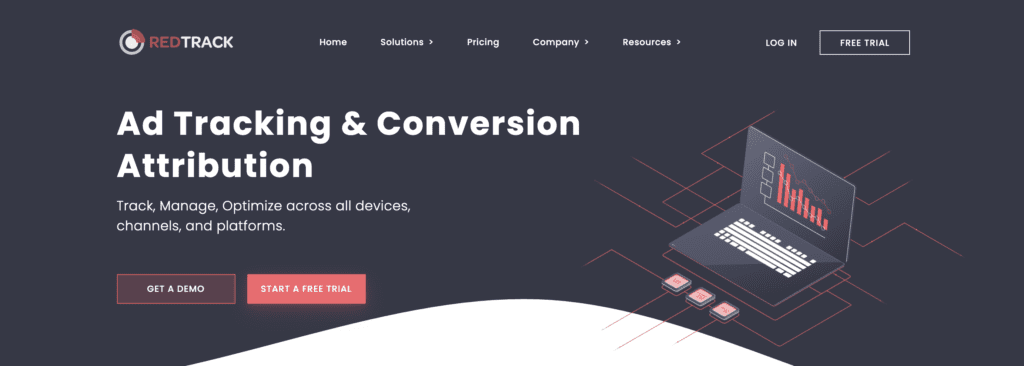Written by Polina Fetissova, Content Producer at RedTrack.io
It’s been almost a year since Facebook advertising changed forever.
As affiliate marketers, we lost the ability to use Facebook Ads in the way we all loved: easy tracking, easy targeting, profound results, and escalated revenue.
So, let’s review the ways that Facebook advertising for affiliate marketing changed in 2021 – and whether Facebook is still a good advertising channel for affiliate marketing. We will also touch on the must-follow rules and principles of Facebook Ads after the privacy updates.

ClickBank recently partnered with RedTrack.io to provide accurate conversion tracking for affiliate marketers advertising ClickBank offers. This integration helps affiliate marketers track all of their conversions and optimize their campaigns for better results.
In this article, RedTrack’s team is sharing their tech knowledge on how Facebook advertising will work in 2022!
[hubspot portal=”5154711″ id=”7642b9fe-5d46-49e7-aa54-737c33f9221c” type=”form”]What’s New in Facebook Conversion Tracking for Affiliates After 2021?
As we all know, Apple’s iOS 14 update changed the game for the digital advertising industry. This update was one of the major movements towards the cookieless future that we’ve been talking about for a while now. Facebook had to change its regulations to prepare for a new era of advertising.
The changes cover the following:
Is Facebook Pixel dead?
Here is one of the most frequent questions we get at RedTrack: “Is Facebook Pixel dead?”
And the answer is short and simple: no, it’s still alive. Facebook Pixel still works. It collects the data, but it’s not able to use it for proper targeting and optimization like it used to.
Facebook CAPI came along as a first-party based method to track conversions, as well as report that data for optimization and targeting.
There are a couple of benefits that CAPI holds:
- It works from a server side, which makes it a more reliable tracking method
- It doesn’t get blocked like Facebook Pixel
- It ensures accurate tracking and attribution if you are able to collect needed data for the algorithms
Domain Verification for Affiliate Marketers
Another important change that affiliate marketers faced after iOS 14 is the new requirement to verify domains. For some, this wasn’t an issue at all – just a few clicks and the thing is done.
However, if you are like many affiliate marketers, you may not have direct access to a merchant’s domain (i.e. the lander where the conversion happens).
These affiliate marketers need a workaround that can help verify domains to continue advertising, optimizing, and targeting. Fortunately, RedTrack developed a solution that helps verify affiliate landing pages, even if you don’t have access to the vendor’s domain as an affiliate!
What is Aggregated Events Measurement?
Another important player of the season is Aggregated Events Measurement (AEM).
AEM is Facebook’s approach to measure web events after the privacy updates. It helps not only measure events, but to ensure optimization.
The main disadvantage coming with AEM is that you can only add 8 conversion events for configuration at a time and only 1 event can be set as a priority.
To make it even more “entertaining,” you cabnot upload just any event to AEM, as the event has to be “warmed up,” meaning that it’s gotten some traction (clicks, conversions, etc.).
How to deal with Aggregated Events Measurement for affiliate marketing?
We have a recommended action plan to make sure your Facebook advertising efforts won’t be damaged, especially when trying to use novelty AEM.
1) First of all, make sure your domain is verified. Adding events to AEM without domain verification is not possible. This helps Facebook to identify conversions as trustworthy, which is very important in a cookieless world.
2) Warm up your events before trying to add them to AEM. You either have to wait for the event to naturally get some clicks and conversions (which can take days) or you can upload fake conversions to warm up the event faster.
3) Choose up to 8 events for uploading to AEM and set priority accordingly. Remember that the events in first place will have the most priority, and so on down to the last event with the least priority.
4) Now, you can optimize your campaigns for the event of your choice, once the events have made it to AEM.
Is Facebook advertising for affiliate marketing still alive after all the privacy updates?
To conclude, we would like to answer the biggest question and dilemma of 2021: is Facebook Ads still a good channel for affiliate marketers?
It is clear that Facebook advertising changed in 2021. And looks like the changes are permanent. Returning to the way tracking, targeting, and optimization worked previously is not anywhere on the horizon.
But still, we can’t say that Facebook Ads is not a fruitful channel for affiliate marketers. The Facebook audience is still there, even if it is harder to target them now.
So, what we recommend you do is follow all the regulations and recommendations that Facebook issues, because that’s the only way to ensure that you can get the most out of Facebook Ads.
Before switching to any other advertising channels, make sure that you verify your domain, set up your CAPI, figure out Aggregated Events Measurement, and upload all the events for optimization. Many affiliates are still finding success with Facebook, so give it a fair shake before you move on to “greener pastures.”
And most importantly, make sure you’ve got the tracking you need to optimize your results from Facebook Ads!
RedTrack is a trusted partner for affiliates trying to handle Facebook CAPI. With RedTrack’s first-party data tracking and attribution, you can be sure to have all of your conversions tracked to later use that info for optimization and targeting!







